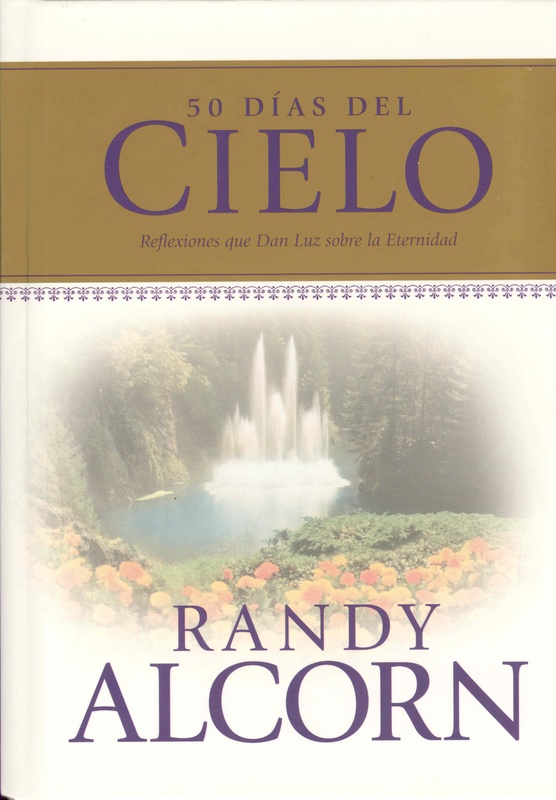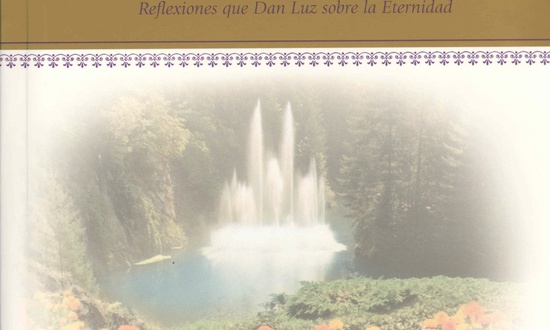Ana dio gracias a Dios y comenzó a hablar del niño a todos los que esperaban la redención de Jerusalén. — Lucas 2:38
El reino de Dios . . . no quiere decir simplemente la salvación de ciertos individuos, ni siquiera la salvación de un grupo escogido de personas. Quiere decir nada menos que la completa renovación del cosmos entero, culminando en el nuevo cielo y la nueva tierra. —Anthony Hoekema
La mayor parte de las culturas creen en la vida después de la muerte. La pregunta no es si la gente va a vivir para siempre, sino dónde van a vivir y en qué condición. La mayor parte de las culturas también tiene un concepto del Cielo y del Infi erno. Ve a algunas personas como que tienen una calidad de vida eterna que es mucho más que una simple existencia, y a otras las ve viviendo en un estado de muerte eterna más bien que de vida. Este punto de vista por cierto que es compatible con lo que enseñó Jesús: “Aquéllos [los injustos] irán al castigo eterno, y los justos a la vida eterna” (Mateo 25:46).
Es triste, pero muchos de los que creen en el Cielo piensan que es un lugar aburrido e indeseable. Esta perspectiva podría ser resumida mejor por las palabras de George Bernard Shaw, el dramaturgo irlandés, quien observó: “El Cielo, como se concibe convencionalmente, es un lugar tan soso, tan aburrido, tan inútil, tan desdichado, que nadie se ha atrevido a describir un día entero en el cielo, aunque muchos han descrito un día a la orilla del mar.” Sin embargo, el punto de vista de Shaw está en absoluto contraste con la mentalidad de los cristianos primitivos, cuya anticipación del Cielo encontramos preservada en las catacumbas romanas, donde se enterraron los cuerpos de muchos cristianos del siglo primero que fueron martirizados. Estas cavernas subterráneas están llenas de inscripciones tales como las siguientes, que se encontraron en tres tumbas separadas:
En Cristo, Alejandro no está muerto sino vive.
Uno que vive con Dios.
Él fue llevado a su morada eterna.
Un historiador escribe: “Dibujos en las paredes de las catacumbas representan al Cielo con hermosos paisajes, niños jugando y personas comiendo en banquetes.”
En 125 d.C., un griego llamado Arístides le escribió a un amigo acerca del cristianismo explicándole por qué esta “nueva religión” tenía tanto éxito: “Si un hombre justo entre los cristianos deja este mundo, ellos se regocijan y le dan gracias a Dios, y acompañan su xi cuerpo con canciones y agradecimiento como si fuera de un lugar a otro cercano.”
Las perspectivas de estos cristianos primitivos nos suenan casi extrañas hoy en día, ¿no es verdad? Pero sus creencias estaban arraigadas en las Escrituras en pasajes tales como Filipenses 1:21-23, donde el apóstol Pablo escribe: “Para mí el vivir es Cristo y el morir es ganancia. . . . ¿Qué escogeré? . . . Deseo partir y estar con Cristo, que es muchísimo mejor.” Pablo también escribió: “Sabemos que mientras vivamos en este cuerpo estaremos alejados del Señor. . . . Preferiríamos ausentarnos de este cuerpo y vivir junto al Señor” (2 Corintios 5:6, 8).
A través de los siglos, el Cielo ha jugado un papel importantísimo en las vidas de los hijos de Dios. El Cielo es la estrella polar con la cual innumerables creyentes han navegado a través de la vida. ¿Pero se ha dado cuenta? Hoy en día, en gran parte, el Cielo no se encuentra en las pantallas de nuestros radares. Si somos honestos, debemos admitir que no estamos diaria y conscientemente anhelando el Cielo, y mucho menos la Nueva Tierra. Hemos reducido el Cielo a algo que es de otro mundo, y hemos ignorado la clara promesa bíblica de un universo redimido en el cual serviremos como los gobernadores que Dios ha delegado. Nos hemos vuelto ciegos a la verdad, y hemos perdido nuestro vocabulario que expresa maravillas y nuestra anticipación del gran y glorioso plan que Dios tiene preparado para nosotros. Jesús dijo del diablo: “Cuando miente, expresa su propia naturaleza, porque es un mentiroso. ¡Es el padre de la mentira!” (Juan 8:44). Algunas de las mentiras favoritas del diablo son acerca del Cielo.
En su corta historia titulada “The Country of the Blind [El País de los Ciegos],” H. G. Wells escribe sobre una tribu en un remoto valle que se encuentra cercado con una enorme cordillera, separado del resto del mundo por una enorme avalancha que ha destrozado los desfi laderos. Como resultado de una terrible epidemia, generaciones sucesivas de esta tribu nacen todos ciegos. Finalmente, como cultura, pierden el concepto de la visión y no tienen conciencia del mundo que no pueden ver. Debido a su discapacidad, no saben su verdadera condición. Cuando un extranjero que puede ver llega al pueblo, piensan que es una criatura recién formada, con sentidos imperfectos, y que todo lo que dice en cuanto a ver es locura. No pueden entender esa otra dimensión llamada vista. Aunque se han adaptado a sus circunstancias, no se pueden imaginar qué mundos puede haber más allá de su valle.
Espiritualmente, vivimos en el país de los ciegos. La enfermedad del pecado nos ha cegado a la verdad acerca de Dios y del Cielo, que son reales aunque no los podamos ver. Afortunadamente, Jesús ha venido desde el Cielo a nuestro valle para hablarnos de su Padre y del mundo más allá. Si lo escuchamos —lo cual requiere un esfuerzo concentrado para vencer nuestras presuposiciones, nuestra ignorancia y las mentiras del diablo—, obtendremos una mejor comprensión de nuestras circunstancias presentes y del mundo venidero. Ya no nos conformaremos a este siglo, sino que seremos transformados por medio de la renovación de nuestro entendimiento (Romanos 12:2, RV60). Como consecuencia, nuestras vidas cambiarán para siempre.
Cuando Jesús les dijo a sus discípulos: “En el hogar de mi Padre hay muchas viviendas. . . . Voy a prepararles un lugar” (Juan 14:2), en forma deliberada eligió términos físicos comunes (hogar, vi viendas, lugar) para describir a dónde iba y lo que estaba preparando. Él quería darles a sus discípulos (y a nosotros) algo tangible xiii que anticipar —un lugar real, un hogar donde ellos (y nosotros) iríamos para estar con él.
El Cielo que describe Jesús no es un mundo inmaterial de espíritus incorpóreos. Un lugar así nunca podría ser un hogar para nosotros, porque los seres humanos no están hechos para una existencia inmaterial. Un lugar por naturaleza es algo físico, al igual que por naturaleza los seres humanos son tanto físicos como espirituales. Y hemos sido hechos —hemos sido diseñados específi camente— para un lugar como el que Dios ha hecho para nosotros: la Tierra. Fuimos hechos de la tierra y para la Tierra. La Tierra es nuestro hogar.
Cuando Ana vio al niño Jesús, “dio gracias a Dios y comenzó a hablar del niño a todos los que esperaban la redención de Jerusalén” (Lucas 2:36-38).
Las personas con las cuales Ana habló acerca de Jesús, el Mesías-Rey, eran “los que esperaban la redención de Jerusalén,” y que estaban haciendo exactamente lo que Pedro dice que debemos hacer: “espera[r] un cielo nuevo y una tierra nueva, en los que habite la justicia” (2 Pedro 3:13). Este es el evangelio del Reino. Cualquier cosa que sea menos es un plan limitado y truncado del plan redentor de Dios.
Dios no cometió un error cuando formó al primer ser humano del polvo de la tierra. Él no estaba hablando en forma metafórica cuando dijo que quería que la humanidad viviera en la Tierra y que gobernara la Tierra. Y Dios no ha abandonado su plan y diseño originales. Un día, él restaurará lo que ha sido corrompido por el pecado, y traerá al Cielo a un lugar llamado la Nueva Tierra. Allí es donde nos invita a cada uno de nosotros a ir a vivir con él para siempre.
Si captamos esta notable verdad, nos daremos cuenta fi nalmente de que nuestro problema más básico no es que queremos demasiado. Al contrario, es que queremos muy poco. C. S. Lewis lo expresa de esta manera: “Si consideramos las extraordinarias promesas de recompensas en los Evangelios, parecería que Dios no encuentra que nuestros deseos sean demasiado fuertes, sino demasiado débiles. Somos criaturas tibias que jugamos con las bebidas y los impulsos sexuales y la ambición cuando se nos ofrece gozo infi nito, al igual que un niño ignorante que quiere continuar haciendo tortas de barro en un barrio pobre porque no puede imaginarse lo que signifi ca una oferta de una vacación a orillas del mar. Nos conformamos con muy poco.”
Cuando se trata de entender el Cielo, ¿ha estado usted conforme con muy poco?
Extracto de 50 Días del Cielo by Randy Alcorn, Introducción
INTRODUCTION: Learning to See in the Country of the Blind
[Anna] gave thanks to God and spoke about the child to all who were looking forward to the redemption of Jerusalem. — Luke 2:38
The kingdom of God…does not mean merely the salvation of certain individuals nor even the salvation of a chosen group of people. It means nothing less than the complete renewal of the entire cosmos, culminating in the new heaven and the new earth. — Anthony Hoekema [1]
Most cultures believe in an afterlife. At question is not whether people will live forever, but where they will live and in what condition. Most cultures also have a concept of Heaven and Hell. They see some people as having a quality of eternal life that is far more than mere existence and others as existing forever in a state of eternal death rather than life. This view is certainly consistent with what Jesus taught: “Then they [the unrighteous] will go away to eternal punishment, but the righteous to eternal life” (Matthew 25:46).
Sadly, many who believe in Heaven think of it as a dull and undesirable place. This perspective might best be summarized by the Irish playwright George Bernard Shaw, who observed, “Heaven, as conventionally conceived, is a place so inane, so dull, so useless, so miserable, that nobody has ever ventured to describe a whole day in heaven, though plenty of people have described a day at the seashore.” Shaw’s view, however, is in stark contrast to the mind-set of the early Christians, whose anticipation of Heaven we find preserved in the Roman catacombs, where the bodies of many martyred Christians of the first century were buried. These underground caverns are filled with inscriptions such as the following, found on three separate tombs:
In Christ, Alexander is not dead, but lives.
One who lives with God.
He was taken up into his eternal home.
One historian writes, “Pictures on the catacomb walls portray Heaven with beautiful landscapes, children playing, and people feasting at banquets.” [2]
In AD 125, a Greek named Aristides wrote to a friend about Christianity, explaining why this “new religion” was so successful: “If any righteous man among the Christians passes from this world, they rejoice and offer thanks to God, and they escort his body with songs and thanksgiving as if he were setting out from one place to another nearby.”
This early Christian perspective sounds almost foreign to us today, doesn’t it? But their beliefs were rooted in Scriptures such as Philippians 1:21-23, where the apostle Paul writes, “To me, to live is Christ and to die is gain.…Yet what shall I choose?…I desire to depart and be with Christ, which is better by far.” Paul also writes, “As long as we are at home in the body we are away from the Lord. We…would prefer to be away from the body and at home with the Lord" (2 Corinthians 5:6-8).
Throughout the ages, Heaven has played a dominant role in the thoughts and lives of God’s people. Heaven is the North Star by which countless Christians have navigated their lives. But have you noticed? Heaven today has largely fallen off our radar screens. If we are honest, we must admit that we are not daily and consciously looking forward to Heaven, much less to a New Earth. We’ve reduced Heaven to an otherworldly state, and we’ve ignored the clear biblical promise of a redeemed universe over which we will serve as God’s delegated rulers. We’ve become blinded to the truth, and we’ve lost our vocabulary of wonder and our anticipation of the great and glorious plan that God has in store for us. Jesus said of the devil, “When he lies, he speaks his native language, for he is a liar and the father of lies” (John 8:44). Some of Satan’s favorite lies are about Heaven.
In his short story “The Country of the Blind,” H. G. Wells writes of a tribe in a remote valley deep in a towering mountain range, cut off from the rest of the world by a massive avalanche that has destroyed the mountain passes. As a result of a terrible epidemic, successive generations of this tribe are all born blind. Eventually, as a culture, they lo9se the very concept of vision and have no awareness of the world they’re unable to see. Because of their handicap, they do not know their true condition. When an outsider, who can see, stumbles into their village, they think he is a newly formed creature, with imperfect senses, and that all his talk of seeing is craziness. They cannot understand this other dimension called sight. Although they have adapted themselves to their circumstances, they cannot imagine what realms might lie beyond their valley.
Spiritually speaking, we live in the Country of the Blind. The disease of sin has blinded us to the truth about God and Heaven, both of which are real, yet unseen. Fortunately, Jesus has come to our valley from Heaven to tell us about his Father and the world beyond. If we will listen to him—which requires a concerted effort to overcome our presuppositions, our ignorance, and the devil’s lies—we will gain a new understanding of our present circumstances and of the world to come. We will no longer be conformed to the pattern oft his world but will be transformed by the renewing of our minds (Romans 12:2). Consequently, our lives will be forever changed.
When Jesus told his disciples, “In my Father’s house are many rooms.…I am going there to prepare a place for you” (John 14:2), he deliberately chose common, physical terms (house, rooms, place) to describe where he was going and what he was preparing. He wanted to give his disciples (and us) something tangible to look forward to—an actual place, a home, where they (and we) would go to be with him.
The Heaven that Jesus described is not an ethereal realm of disembodied spirits. Such a place could never be home for us, because human beings are not suited for a nonmaterial existence. A place is by nature physical, just as human beings are by nature physical as well as spiritual. What we are suited for—what we’ve been specifically designed for—is a place like the one God made for us: Earth. We were made from the earth and for the earth. Earth is our home.
When Anna saw the young Jesus, “she gave thanks to God and spoke about the child to all who were looking forward to the redemption of Jerusalem” (Luke 2:36-38).
The people to whom Anna spoke about Jesus the Messiah-King, those “looking forward to the redemption of Jerusalem,” were doing exactly what Peter says we should be doing: “looking forward to a new heaven and a new earth, the home of righteousness” (2 Peter 3:13). This is the gospel of the Kingdom. Anything less is a narrow and truncated concept of God’s redemptive plan.
God didn’t make a mistake when he formed the first human being from the dust of the earth. He wasn’t speaking merely metaphorically when he said he wanted humanity to live on the earth and rule the earth. And God has not abandoned his original design and plan. One day, he will restore that which has been corrupted by sin, and he will bring Heaven down to a place called the New Earth. That is where he invites each of us to come live with him forever.
If we grasp this remarkable truth, we will realize at last that our most basic problem is not that we want too much. On the contrary, it is that we are content with too little. C. S. Lewis put it this way: “If we consider the unblushing promises of rewards in the Gospels, it would seem that our Lord finds our desires not too strong, but too weak. We are half-hearted creatures, fooling about with drink and sex and ambition when infinite joy is offered us, like an ignorant child who wants to go on making mud pies in a slum because he cannot imagine what is meant by the offer of a holiday at the sea. We are far too easily pleased.” [3]
When it comes to understanding Heaven, have you been content with too little?
Excerpt from 50 Days of Heaven by Randy Alcorn, Introduction
Notes
1 Anthony A. Hoekema, The Bible and The Future (Grand Rapids: Eerdmans, 1979), 50-54.
2 Ulrich Simon, Heaven in the Christian Tradition (London: Wyman and Sons, 1958), 218.
3 C. S. Lewis, The Weight of Glory and Other Addresses, revised and expanded edition (New York: Macmillan, 1980), 3-4.




